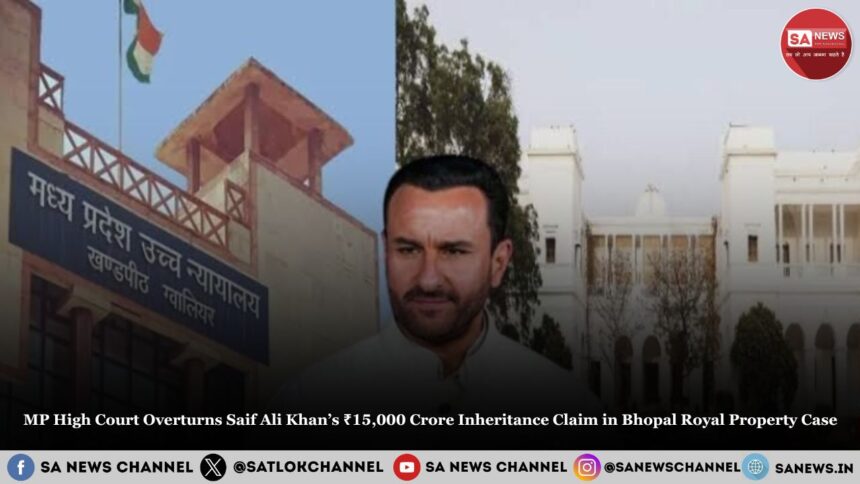In a major turn of events, the Madhya Pradesh High Court has overturned a 25-year-old trial court order that had granted Saif Ali Khan and his family ownership rights over the Bhopal royal estate. The estate, valued at over ₹15,000 crore, will now undergo a fresh legal review.
- Trial Court’s 2000 Verdict in Saif’s Favor
- Other Heirs Opposed the Decision
- High Court Orders a Fresh Trial
- Enemy Property Tag on the Estate
- What Is Enemy Property?
- What This Means for Saif Ali Khan’s Family
- Multiple Heirs, One Palace: Who Will Win?
- Spiritual Perspective: Real Property Is Not of This World
- FAQs about the Bhopal Royal Inheritance Dispute
Trial Court’s 2000 Verdict in Saif’s Favor
In the year 2000, a trial court decided in favor of Sajida Sultan’s heirs, including actor Saif Ali Khan, his mother Sharmila Tagore, and his sisters Soha and Saba,vgranting them ownership of two key properties belonging to the last Nawab of Bhopal, Hamidullah Khan.
Other Heirs Opposed the Decision
This judgment was immediately challenged by descendants of Nawab Hamidullah’s elder brother and his other daughter, Rabia Sultan. They argued that the trial court had wrongly assumed the properties were part of the royal throne and should automatically pass to the next successor.
Their argument was simple: these were personal properties, and should be divided according to Muslim Personal Law (Shariat) Act, 1937, which governed property succession at the time of the Nawab’s death in 1960.
High Court Orders a Fresh Trial
The High Court found that the earlier trial court decision was flawed, relying on an outdated legal precedent that had already been overruled by the Supreme Court in 2019. Therefore, the High Court has directed the lower court to restart the hearing and complete the entire process within one year.
Enemy Property Tag on the Estate
Another blow to Saif Ali Khan’s legal standing came when the government classified the Bhopal royal properties as ‘enemy property’. This was due to Abida Sultan, Nawab Hamidullah’s eldest daughter, choosing to migrate to Pakistan in 1950.
Under the Enemy Property Act, any property owned by someone who moved to an enemy nation is seized by the Indian government. This means the government now holds legal authority over the Bhopal estate unless that status is overturned.
What Is Enemy Property?
Enemy property refers to any asset or land left behind in India by individuals who migrated to an enemy nation primarily Pakistan or China during or after wars or partition. These properties are seized by the Indian government under the Enemy Property Act, 1968, and are managed by the Custodian of Enemy Property for India.
In the Bhopal inheritance case, this law became relevant because Abida Sultan, the eldest daughter of Nawab Hamidullah Khan, migrated to Pakistan in 1950. Even though she renounced her claim to the estate, her migration alone was enough to trigger the Enemy Property Act.
As a result, a large portion of the Bhopal royal estate is now marked as enemy property, meaning no private individual, not even Saif Ali Khan’s family, can claim ownership unless the designation is legally removed by the government or court. This has significantly complicated the case and weakens all current inheritance claims.
What This Means for Saif Ali Khan’s Family
This new development leaves the actor’s family in a vulnerable legal position. Not only is their previous win void, but they will also have to fight in court again, this time against more claimants and under stricter legal guidelines.
Multiple Heirs, One Palace: Who Will Win?
The retrial will examine who the legal heirs actually are. With multiple branches of the Nawab’s family involved, including descendants of his elder brother, the case could lead to a partition of property, or complete loss if the Enemy Property classification holds.
Spiritual Perspective: Real Property Is Not of This World
Before the conclusion, this dispute reminds us of a deep spiritual truth. As taught by Sant Rampal Ji Maharaj, material property, no matter how grand or royal, is temporary.
“All this property will be left behind. We all must die one day. The real home is Satlok, not this world,” says Sant Rampal Ji Maharaj.
This world is known as Kaal’s Lok, the realm of suffering. It is purposely designed so that souls stay trapped in illusion, grief, and competition. Even royal heirs are not spared. They fight, suffer, and leave everything behind, just like countless kings and emperors before them.
True peace and ownership lie only in Satlok, the eternal home of the Supreme God, beyond birth, death, and sorrow. To know more Subscribe to Satlok Ashram YouTube channel.
FAQs about the Bhopal Royal Inheritance Dispute
Q1. Why did the MP High Court cancel the 2000 decision?
Because it was based on a wrong assumption that private properties were part of the throne and ignored valid Islamic inheritance law.
Q2. What is the Enemy Property Act?
It allows the Indian government to seize property from individuals who migrated to enemy countries like Pakistan. Abida Sultan’s migration triggered this rule.
Q3. Can Saif Ali Khan’s family still win the case?
They can fight their case in the new trial, but they now face stronger opposition and the obstacle of the enemy property status.
Q4. Who else has a claim on the Bhopal royal estate?
Other heirs include descendants of Nawab Hamidullah’s elder brother and daughter Rabia Sultan.
Q5. What spiritual insight does this case offer?
That no matter how vast the property, all of it will be left behind. Real peace is found in Satlok, the eternal home of souls, beyond materialism and legal battles.









